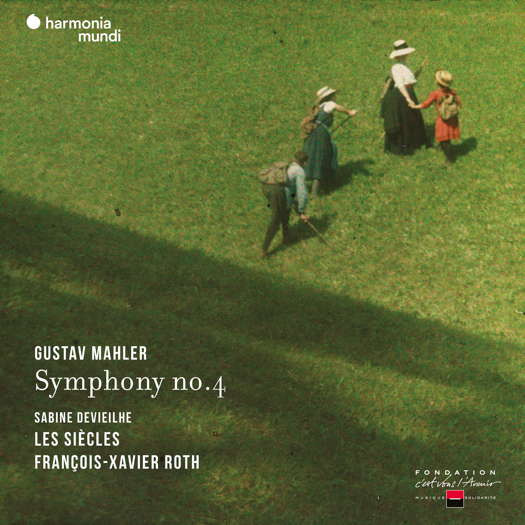- Covent Garden
- The Magic Flute
- Nicolas Reveles
- Vancouver
- Anna Tsybuleva
- Steve Reich
- Frank Withy
- Tokyo New Philharmonia

Tender and Intimate
GEOFF PEARCE listens to Mahler's Fourth Symphony
'I find this recording very satisfying on so many levels.'
I always look forward to hearing Les Siècles conducted by François-Xavier Roth, partly because they employ instruments from around the period that the music was composed, but also because they have always struck me as making thoughtful recordings that bring new insight from what I so often hear. I have always loved Mahler's Fourth Symphony. It is smaller than the others, and in a lot of ways, more tender and intimate, but within this, there is a lot of contrast, and I wonder if, in this symphony, one might glimpse more of a reflection of the character of the composer.
Right from the outset of the first movement, I find the soundscape quite different from any of the other recordings I have heard. There is also a clarity that is often missing, so that one can appreciate the different lines and textures that are often obscured. The wind and brass certainly sound somewhat different from what we are used to hearing today. I hear more character and differentiation, where today, there is a greater attempt for sections to blend more. I am not saying this is a good or a bad thing, but it's just what I hear. I have heard this orchestra play impressionist French music and the difference from what you hear with a modern orchestra is not as marked as in this recording, which is very refreshing, and the range of colours is astounding. Another thing that I appreciate is that Roth is very sensible with his speeds and tempo changes, and he does not seek to wring every bit of emotion from this work as some conductors do. The lead up to the coda, and the coda itself is breathtaking in its effectiveness.
Listen — Mahler: Bedächtig, nicht eilen (Symphony No 4 in G)
(HMM905357 track 1, 14:40-15:30) ℗ 2022 harmonia mundi musique sas :
The second movement, with its retuned solo violin and whirling passages and spiky articulation and those augmented fourths, is rather unsettling. There are a lot of counter melodies going on, weaving around the main themes, often rather bizarrely accented. The detail here is very finely wrought, and I find this the most detailed and satisfying of the accounts of this movement I have heard. There are luscious warm sections, but the unsettled nature is never far away, and the more characterful instruments of the period, I believe, help to make this movement stand out more than in many other performances.
Listen — Mahler: In gemächlicher Bewegung, ohne Hast (Symphony No 4 in G)
(HMM905357 track 2, 0:00-0:46) ℗ 2022 harmonia mundi musique sas :
The third movement is serene, completely contrasting what has come before it, with the gentle tender opening of just strings until the oboe comes in, followed by horns. This is one of the most beautiful moments in all music, and never ceases to move me to tears since the first time I heard it in my youth. For all the thrill of the grand movements of the larger symphonies that really get the heart racing, this is a balm to the soul, even in the section which is a little uneasy and passionate, about five minutes or so in. I find a very wide range of emotions here - this movement is certainly one of contrast and there are a few passionate outbursts, and also moments where I feel desolation, but ultimately, one feels hope, warmth and comfort.
Listen — Mahler: Ruhevoll, poco adagio (Symphony No 4 in G)
(HMM905357 track 3, 15:55-16:42) ℗ 2022 harmonia mundi musique sas :
The final movement is built around a song from Des Knaben Wunderhorn poems entitled 'Heavenly Life'. This setting was not included in Mahler's set of songs based on these poems. This is a child's view of life in heaven with its feasting, joy and dancing, but also the darker moments where animals are slaughtered, but in the final section where the music returns to the opening of the movement, there is an orchestral postlude that gradually fades away. I have heard many fine singers perform this movement and there have been a number of approaches to it, such as in one Bernstein recording where he uses a boy soprano to express the innocence and wonder of this world of heaven. I do like this current recording, where Sabine Devieilhe uses her voice subtly and is sensitive to use vibrato relatively unobtrusively.
Listen — Mahler: Wir geniessen die himmlischen Freuden (Symphony No 4 in G)
(HMM905357 track 4, 7:10-8:09) ℗ 2022 harmonia mundi musique sas :
I find this recording very satisfying on so many levels. François-Xavier Roth is one of those conductors who has great insight and pays real attention to the score. I find his concepts have clarity that reveal much that is frequently overlooked. I am also impressed with the overall sound of Les Siècles. There is a greater individuality in the timbre of the wind instruments and the recording is certainly very clean. I also like the fact the portamentos are still present but not overdone. I have many recordings of this symphony and this is my favourite. I am sure many other listeners will feel the same.
Copyright © 19 August 2022
Geoff Pearce,
Sydney, Australia

CD INFORMATION - MAHLER: SYMPHONY NO 4 - LES SIÈCLES / ROTH




